hardware literature
art fiction film music television history language poetry stores tools hardware catalog jmcvey.net
This page lists first-person memoirs (and other books) about individual hardware stores, followed by
paeans and ubi sunts.
This page is currently undergoing an overhaul, links might not be current as of 30 June 2023.
![]()
- Bernard W. Aubuchon Jr. Aubuchon Hardware. A volume in the Images of America series, Arcadia Publishing, 2008
Aubuchon is a Massachusetts based chain operating throughout New England. Mainly photographs and captions — of store interiors and fronts, store openings, managers and employees. A
marketing
chapter treats signs, advertisements, delivery trucks (including toys), even sponsorship of NADSCAR racing.A great photograph of Lester J. Archambeault on his lunch break, in a basement warehouse in late 1940s, surrounded by stock. “Lester was in charge of merchandising, planograms, and inventory.” “.”

- Chown Hardware
Founded in Portland in 1879; has evolved from tools/hardware to what is now a focus on architectural/design hardware. Locations in Portland, and in Bellevue and Seattle (Washington). Some history at company website : link
Chown Hardware : Memoir of a Family Business
[by] Frank Chown, as told to Susan Goschie and David Michael Smith (ca 2004; 145pp)
eBay description (and some images) : link (Boyd Used & Rare Books)chapters —
The Early Chowns : Coming to America
FR Chown : A Portland Pioneer
D. B. Chown : Rising to the Occasion
The Fourth Street Store : The Chown Era Begins
Frank Chown : From Father to Son
Don Hartvig : Just Like Family
The Power of Promotion : The Art and Science of Selling
Sixteenth Street Store : Expanding the Dream
Building Relationships : Suppliers and Customers
The Chown Hardware Family (profiles of 20 employees, and some thoughts about employee longevity, and families in general)
Eleanor Chown : The Mrs. Makes Her Mark
The Fourth Generation : Another New Era Begins
Epilogue : A Philosophy of Enduring SuccessChown Hardware : website
instagram : link
- H. Kellogg Day. About Ninety-Seven Years and a Day. New York: Vantage Press, 1980
204 pages are followed by 22 pages of photographs. Focus mostly on people, family, interests (collections — 1000 lead pencils, 800 key chains — field sports etc).
Store was known for a time as Day’s Hardware and Music Store. See mostly chapter 2. Interesting section on patent and right to manufacture Allen’s AI Compound Babbit Metal —
It gave us a thrill to see the home product listed in the catalogs. It was a hard day for all but a change from the routine of selling and added a bit to the income.

- Ellis, Helen.
“Helen Ellis later said she had always dreamed of running a hardware store or a bookstore, and the bookstore won out.”
re: The Whaler Bookshop, New Bedford, Massachusetts, in
Judith N. Lund (Curator) and Margaret K. Rodgers (Docent), Helen Elizabeth Ellis (1889-1978)
Dartmouth Historical Sketch Number 44 (1994) : 8 : link
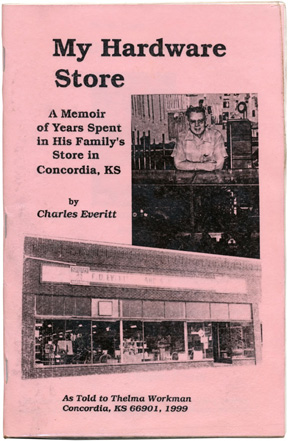
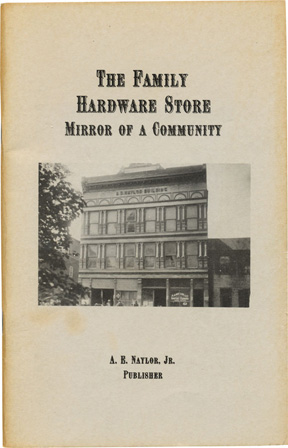
Charles Everitt, My Hardware Store: A Memoir of Years Spent in His Family’s Store in Concordia, Ks (1999)
Cover (of thiscopy, anyway) is wrapped in adhesive backed transparent plastic.Mary I. Love, The Family Hardware Store, Mirror of a Community (1984)

- Charles Everitt. My Hardware Store: A Memoir of Years Spent in His Family’s Store in Concordia, Ks,
As Told to Thelma Workman / Concordia, KS 66901, 1999.
5 1/2 x 8 1/2 inches, 52 pages.
I’m not necessarily going to tell this story in chronological order, but will jump around. But I have a story to tell, not how to run a hardware store or how to buy, but of the funny things that happened in MY HARDWARE STORE.
(p3)Hardware stores don’t really have a plot, just anecdotes, one thing after another. Good stories in here, however. Other works by Thelma Workman (1935-2009) are listed here.

- Tom Fort. Rivets, Trivets & Galvanized Buckets : Life in the village hardware shop. Headline, 2023.
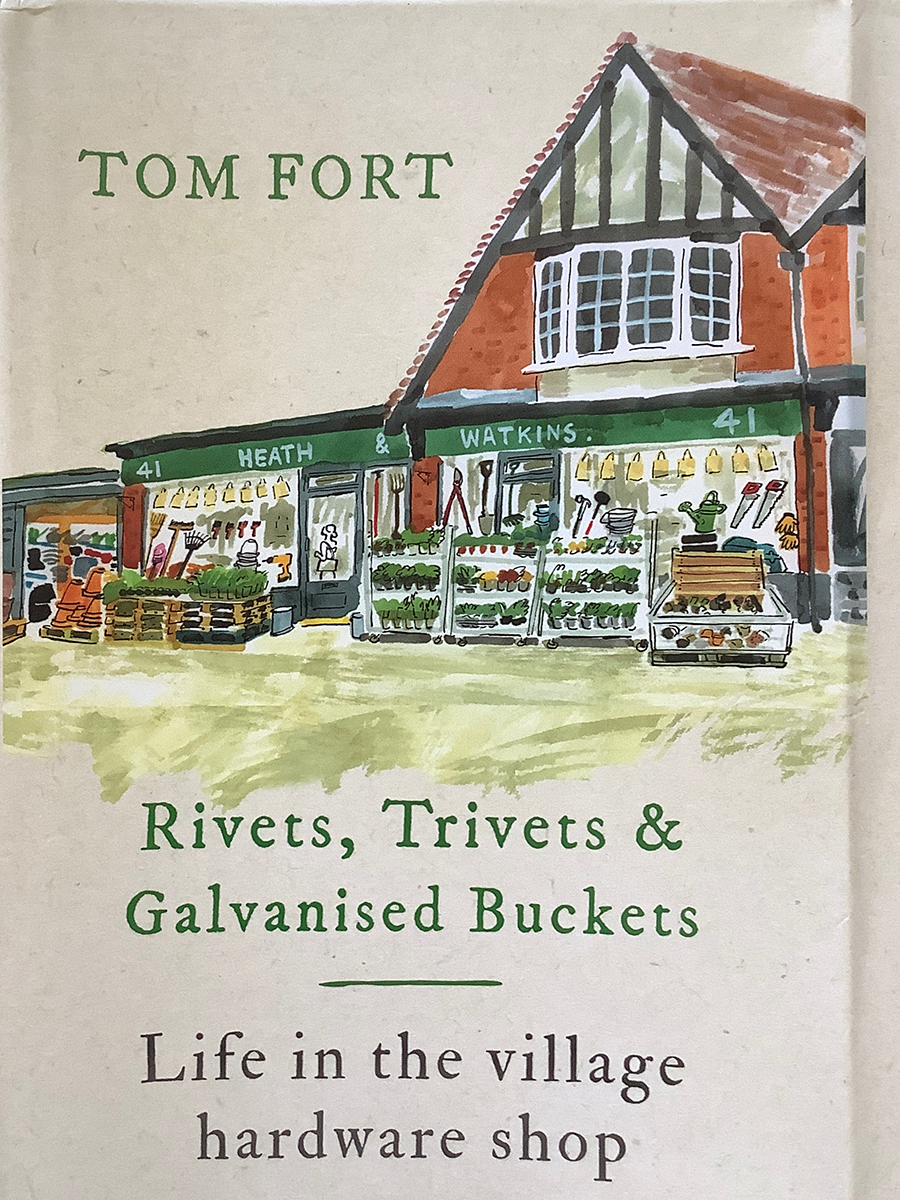
photo cropped to show as much of front cover illustration (by James Oses) as possible.
from the dj flap —
In 2018 Tom Fort’s daughter-in-law took over a century-old hardware shop. The family dreamed of developing the shop into one that would become the centre of village life; that much did come true, but not in the way they had expected.
Interweaving the evolution of the shop, its previous owners, the customers it serves and the items it sells, Rivets, Trivets & Galvanized Buckets offers a delightful study of community and shines a light on the eccentricities of ordinary people. Alongside, it presents a fascinating history of technological development; from who thought of screwdrivers to where the spirit level came from, who devised the process of galvanisation and what genius worked out that a suction pad on the end of a piece of wood could unblock sinks.
As Tom recounts: ‘A little girl came with her father into Heath and Watkins, looked for around for a while and said “”Daddy, this is the shop of EVERYTHING”’. This is the story of how that happened.The store has a facebook page : link
Here is an article about the former and current owners —
‘Uncle Mick’ retires from oldest shop in the village
A SHOPKEEPER in Sonning Common has retired after 21 years running the business.
Mick Wells has sold hardware shop Heath & Watkins in Wood Lane, which opened more than 80 years ago and is the oldest surviving retailer in the village.
author unknown, Henley Standard (29 October 2018) : link
- Winston J. Geldart (1914-1967). For Want of a Nail : The Story of Cochrane-Dunlop Hardware Ltd.
np, nd — 1966, according to Open Library. viii, 104pp.; errata slip pasted in, facing title page.
History of the business, from its start in 1890 in Sudbury, Ontario (northwest of Ottawa), focussing on founder Francis Cochrane (1852-1919).
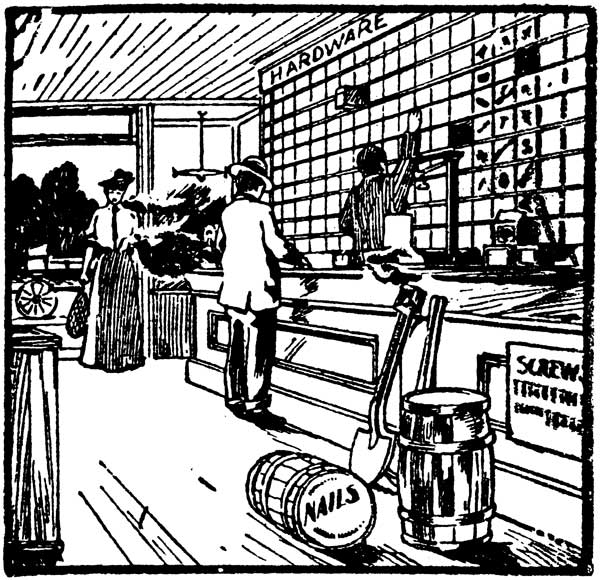
captioned:
The first Cochrane store, 1890
on p9, in chapterThe early years — 1852-1890
probably from a contemporary number of the trade publication Weekly Hardware.My sense is that the Cochrane hardware business was more wholesale in character, at least at this early stage; the image shown above is a somewhat idealized and
typical
representation of conventional retail hardware stores.Nice parallel to the passages on hardware stores in Hugh Hood’s Be Sure to Close Your Eyes and other (Canadian) novels in his The New Age series.
Title is from the epigram of the book —
For want of a nail the shoe was lost
for want of a shoe the horse was lost,
for want of a horse the rider was lost.from Jacula Prundentum by George Herbert, English poet, A.D. 1633.
More on Frank Cochrane, who later served as Minister of Land and Mines, and Federal Minister of Railways and Canals, at the Sudbury Heritage Museum website here.

- David R. Harder. Echoes of a Country Fire Chief. Duvall (Washington): David R. Harder Co., Publisher, 1994
An interesting, energetic autobiography, going back beyond author’s birth in 1932 :
My family has been in the Snoqualmie Valley since the late 1800s. Not too much mundane detail about the hardware business, which must pale compared to author’s work as Fire Chief.For years, we didn’t do much socializing except for the fire department. The hardware store, private life, and fire department all evolved around one another.
The Motto of Duvall Hardware, printed on the trucks, was “If We Can’t Get It — They Don’t Make it!”
Harder died in 2010, a notice appeared in The Woodinville Weekly : link

- Tom Howlett. A History of Century Old Howlett Hardware Store. Xeroxed, 128 pages (Gregory, Michigan, 1990)
Title/cover page offers these clues about content:
Those that founded it and those that continued to tend it; View of its customers and the area it served; The tragic radio bulletin in 1934 that brought change to it; Portions of autobiography by the author who grew up in it.
The business was purchased in 2006 by Mike and Rita Bramlett, and renamed Bramlett Hardware & Heating Co., according to an article in the Livingston Community News (December 21, 2007) : link

- Archie Kelly in collaboration with Percy Kelly. The Early History of Robert Kelly & Sons Ltd. Manchester, n.d., but signatures of authors include date 13 April 1959
An account of a hardware business based in Liverpool, started in 1875 by Robert Kelly, 1845-1925. Nice references to the haphazard nature of the firm’s early account keeping. And this, on the term
ironmonger
—As the shop enlarged the stock also enlarged in variety, father now sold cutlery and hardware of all sorts... ironmongery he would not touch. ¶ He hated to be called an ironmonger, finding some ignominy in the word..
Kelly’s good relationship with Sheffield suppliers of cutting instruments/edge tools (hammers, plane irons, chisels, shoe knives, glass paper, etc. (pp24-25) The firm also got into other lines, including wireless components (p55), garden tools and lawnmowers (p57) and, after the war, heavy machine tools (p69).The founder had apprenticed to a cabinet maker, and
Never was there a more fortunate choice of work, for he was a square peg in a square hole.
Later in his life, as employees took care of the shop, Kelly could devote himself to his workbench in the cellar workshop, improving on machines (including a pipe bending machine and a razor setting machine (he would later take up violin making, in a workshop out in his garden).The basement workshop took in the cutting tools of workers each evening, and sharpened them to be ready for the next day’s work. Quite a bit of the book (74pp) is devoted to the employees, many working for the firm three and four decades. There were expansions, acquisition of other firms, even beyond Liverpool, in Manchester and as far as London, where R. Melhuish, tool merchants at Fetter Lane and Holborn, was purchased in 1930. During the Blitz, buildings were destroyed in Liverpool, Manchester and London, but the business continued.
The firm published a list of engineer’s precision and instrument tools in 1935, followed by an enlarged list in 1952. A copy of Robert Kelly & Sons Engineer’s Tools Catalogue (undated, quarto, 590 grams) is on its way.
There is a mention of a
sidewalk prism
window above the basement workshop at p33.
- Mary I. Love. The Family Hardware Store, Mirror of a Community. A. E. Naylor, Publisher (Oakland, Maryland), 1984
Published on occasion of centennial of A. D. Naylor Company, with stores in Maryland and West Virginia, and serving customers in Pennsylvania as well. A. D. Naylor (1861-1965!) opened a blacksmith operation in 1884, which evolved into carriages, hardware, appliances, as well as contracting. This 55-page account is well-written, includes photographs of store exteriors and interiors, as well as advertising by Naylor (and others). I particularly like the lists appended to the back, that include acknowledgement of people who taped recollections and/or provided other material; major suppliers (George Worthington Co., W. Bingham Co., Hibbard, Spencer, Bartlett & Co.; and Cotter); a list of manufacturers and their lines that were sold by Naylor; and lists of employees over the years. Tries to avoid discussion of the Naylor family
who are not actively involved with the store
(p32; it does include a family tree, however!).The firm remains in good health. Naylor Hardware joined the Cotter True Value cooperative in 1962, but sometime since then became an Ace Hardware business. The author describes quarterly catalogs published in the years 1906-08 by J. M. Davis —
another local hardware business
— thatincluded advertising for local businesses, including Naylor's, along with stories, jokes, and sermons
(p22). She notes how these appear to have been motivated in part by competition with Montgomery Ward and Sears Roebuck. I have noticed that myself, in looking through old Good Hardware magazines.
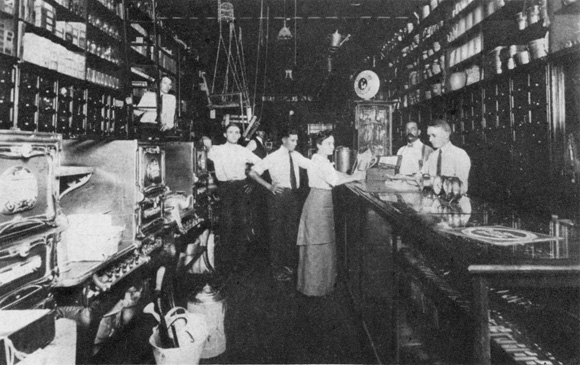
“Typical hardware store in the Ohio Valley Country—1913-14”
facing dedication page, E. B. Pryor, Fifty Years in a Hardware Store (1957) - Early B. Pryor. Fifty Years in a Hardware Store. n.p., 1957
The book features several photographs: the interior view shown above, and several tipped-in four-color photos, of displays for women (p53), Christmas displays (79), color-coordinated display of appliances (111), and display of fireplace appliances
yielding larger profit margins than nails and wash tubs
(129).I like this passage, that alas I can’t use to explain my own trouble with writing and communication generally — In attempting to write this story we believe we discovered a weakness in the hardware field that too many of us possess. Too often we are sharp, abrupt, cutting, plain profit minded, with too little thought of the other fellow on the other side of the counter. When we try to write in story form it just isn’t natural for a hardware man. Our usual writing is abrupt, as abrupt as this:
When will you ship?
When can we expect settlement?
Cancel our order No. 1351.
May we hear from you by return mail?
Our story sounds just like that. So many years doing it the abrupt way isn’t easily changed with pen and ink... (140)The sixth chapter,
Which would you rather do or go fishing?
(pp 91-103) is pretty good in the advice/wisdom department. Ask questions that get your grandson to think.He will probably say,
(95) AndGrandpa is nuts
, but insist on his working out an answer.Give him the idea that he can do things. That you expect things done right when he is given a task.
(96)
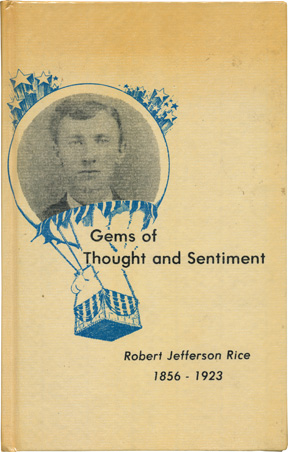
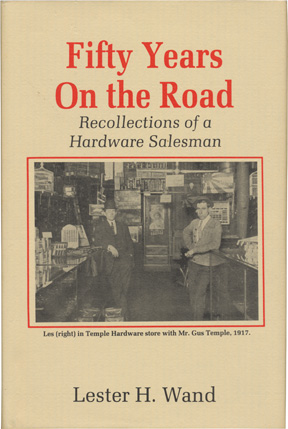
R. J. Rice, Gems of Thought and Sentiment (1977)
Lester H. Wand, Fifty Years on the Road (1986)
- Robert Jefferson Rice (1856-1923). Gems of Thought and Sentiment. Raymond (Illinois), 1977 (?)
This volume, apparently compiled by Robert A. Rice, contains poetry, short essays, and photographs by R. J. Rice, a hardware merchant in Waggoner, Illinois. Its 112 pages include a three-page index. A couple of the poems refer to hardware in their title :
I’m a Hardware Man
(p5) andHardware Poem No. 17
(pp6-7). I will seek permission from that family to transcribe the two poems, becauseFailure to obtain such consent will subject the offender to prosecution.
Alas, I cannot resist; one poem can be found here.In a 1985 interview, long-time Waggoner resident Bud Baker remembers the interior of the store :
Q: What was it like inside?
A: Oh, it looked just... real nice. They had counters there with all kinds of crockery and lamps and lanterns. And then, of course, the sides were all covered with hand tools and they had a lot of halters and — as I remember, they didn’t carry a lot of harness because — oh, they’d have hitch leads and things like that. And you’d have rows of several different sizes of rope, you know, hemp, rope was a great seller back in them days, people used a lot of rope. So, it was, I thought, a real nice hardware store. What interested me most was the pocketknives. (chuckles)
Q: Oh really?
A: Get to look at a whole showcase full of pocketknives, well, that’s quite... The old Barlow knives, that was the main seller back in those days. Sold for a quarter, two-bladed knife.J. Harold
Bud
Baker Memoir (Interview by Horace Q. Waggoner, 1985); B174 Archives, University of Illinois at Springfield)
- Phil Schlemmer. “Hoosier Crossroads,” in Tom Watson and Jim McGarrah, eds., Home Again : Essays and Memoirs from Indiana. Indianapolis: Indiana Historical Society Press, 2006 : 155-65
Memoir of youth in Lagrange, Indiana, ending at Purdue University. Includes a passage about Schlemmer Hardware, which the author’s father and uncle had opened following World War 2, and at which the author works between the ages of eight and fourteen.
But I never worked on Wednesday afternoons. Nobody did. For years the town’s retailers followed a strange custom of shutting down at noon on Wednesdays. All of the stores closed...
Many would repair to abusiness meeting
at Dave’s Corner Bar. Strange: Masse’s Hardware here in Cambridge closes Wednesday afternoons, and my own father’sday off
was Wednesday (which he spent working at home, or perhaps maintaining his rental properties, one in Pasadena for a time, and the other in Eagle Rock).Same collection closes with an essay by Kurt Vonnegut, though it includes nothing about his hardware background.

- Mark Vonnegut. Just Like Someone Without Mental Illness Only More So. New York: Delacorte, 2010
One hundred thirty-nine years ago, my great-grandfather Bernard Vonnegut, fifteen years old, described as less physically robust than his two older brothers, probably asthmatic, started crying while doing inventory at the family hardware store. When his parents asked what was wrong, he said he didn’t know but he thought he wanted to be an artist.
I don’t want to sell nails,
he sobbed.I enjoyed this book; haven’t read the author’s earlier The Eden Express (1975). This extract is from the first chapter,
A Brief Family History,
that includes his powerful observation thatThe arts are not extra.
I would direct anyone to the opening pages of that chapter, and to page 4 in particular, from which this —Art is lunging forward without certainty about where you are going or how to get there, being open to and dependent on what luck, the paint, the typo, the dissonance, give you. Without art you’re stuck with yourself as you are and life as you think life is.
What’s this got to do with hardware? The family’s roots in hardware in Indianapolis, and Bernard Vonnegut’s refusal to pursue the business (he became an architect). This is a good book, about complicated lives including the author’s own.
See also the entry for Kurt Vonnegut his
Who Am I This Time?
(1972/1998)
- Lester H. Wand. Fifty Years on the Road : Recollections of a Hardware Salesman. Austin (Texas): Nortex Press, 1986
...I dislike writing even a personal letter, much less an article and much, much less a book. I do enjoy recalling my early experiences in traveling in Missouri, Illinois, New Mexico and, particularly, in Texas. This book will be of interest, mostly, to men and is, essentially, about the hardware business and hardware salesmen. It bridges a span, roughly, from 1900 to 1960...
A lovely book, completed by the author’s wife, Jessie Wand. Its 96 pages are supported by a nine-page, two-column index.

paeans and ubi sunts
It seems appropriate to separate the following entries from the first-person memoirs/accounts listed above.

- Nick Lyons.
Country Hardware Store,
in Full Creel: A Nick Lyons Reader (New York: Atlantic Monthly Press, 2000): pp 421-425. Published earlier in the same author’s A Flyfisher’s Word (1996)An ambivalent visit to an older store, off the beaten track, and to his own memories. Lists
an irresistable stew
of old stuff, ruminates about old flies and the indisputable virtues of new patterns and designs, the result of constanttinkering and perfecting
that istaking us further and further from the wares of this simple and lovely country tackle and hardware store.
The author/narrator buysa dozen bass bugs made of cork, with feathered tails and rubber legs
that, he conclusively reasons, willwork well in Connecticut.
Nick Lyons is a fisherman and fine writer; nice foreword to this volume by Thomas McGuane.

- Stuart McLean.
Hardware Stores Have All the Answers,
in his collection of essays from the CBC radio programMorningside,
in The Morningside World of Stuart McLean, (Viking Canada, 1989): pp 149-153.Nice essay, and the store seems to be thriving today. Among the reasons that hardware stores are
quiet little corners of perfection
in an imperfect world : hardware stores reflect the seasons, resist encroachments of shrink-wrap, are overstaffed and overstocked, tend to keep the cash register in back, gather hardware store humor, andhouse a symphony of sounds.
McLean describes Wiener’s Hardware as
my
hardware store. The store is in Toronto, and here. A 1948 view of the same store here.
George Kramer, 71, at Kramer’s Hardware in Flatbush, where he knows everything about everything, including the keys.
That is a photocaption to a lovely New York Times article entitled What About George?, 10 January 2010. From which, this:
On the surface, a run-down hardware shop in Flatbush might seem an odd place for a person like George to thrive. But if you set aside the sheets of pegboard and the metal cabinets and the key-making machine, what is left are hundreds and hundreds of small, obscure utilitarian objects, many almost identical to the casual observer. George can identify each nut and bolt and screw on sight... and he knows where, exactly, in the store it is kept. He can tell you its cost. And he can tell you the name — and often the phone number — of the company that made it. // His command of the inventory is such that Mr. Abraham has never had to invest in a computer to track it.
The store (and George) was also featured in a CBS Evening News story (19 April 2010). Here, we learn that George pursues other passions too:
looking at maps and reading the yellow pages.
I cannot resist extracting one more passage, and hope the lawyers might look the other way:
Even the store is sort of a time capsule. Almost all of its products were bought years back, from companies that no longer exist. Piled on the shelves in the rear are boxes and boxes of screws and bolts with old-fashioned labels reading
Sturdy Nut and Bolt Co., New York, N.Y.
andUniversal Screw and Bolt Co., N.Y. N.Y., U.S.A.,
relics from the city’s industrial past.
- Comfort Hardware. Greene, New York
A description (a few years old) here (accessed 19 June 2011).
Went into the store while passing through, mid June 2011. Good smell and strikingly handsome stock, including beautiful displays of knives and of (Mayhew?) cold chisels and punches. Didn’t look upstairs or in the basement. Comfort is a hardware store, but also sports the name
Comfort Electric,
reflecting earlier years when one half of the store sold electrical generators and even radios. The owner and I agreed that hardware stores get in and out of different lines of business; sometimes a new line grows so fast that it takes over, at least for a few years.He mentioned Old Forge Hardware, in Old Forge New York, whose owner keeps buying adjoining businesses (e.g., a bookstore) and incorporating them in his operation. It’s on my list.

- The New Hippodrome Hardware
Hardware Store,
a Talk of the Town piece in The New Yorker (December 23, 1972) : 21-22 (by Susan Sheehan?)The New Yorker’s own summary :
Talk story about the New Hippodrome Hardware Store, located at 70 West 45 St. The New Hippodrome doesn’t sell household appliances, pots and pans, glassware, or any of the other department store items that most hardware stores go in for these days. It specializes in maintenance equipment and its assortment of nails, bolts, plumbing fittings, light bulbs, tools, electrical fixtures, locks, cleansers, brooms, ladders, valves, cements, paints, and solvents suggest the possibility of constructing, repairing and cleaning absolutely anything. Names several stores that elephone in orders, like Abercrombie & Fitch. Describes two types of customers: the construction workers and maintenance men and the office workers who come in on their lunch hours. Tells about the trends and concerns represented in the purchases seen. They are: Fear of Crime, Mobility, Untoward Teenagers, and Do-It-Yourselfism. Tells about the owner of the store, Aaron Landsman, 51. He says that because more and more people are buying their own homes and doing things themselves to beat the rising cost of labor, his business gets better every year.
Good list of what
clutter[s]
the floor, ceiling, shelves, bins and pegboards of the store.permanently closed, says google.
See also Harry Sawyers, “The old hardware at the New Hippodrome,” The Hardware Aisle (August 10, 2007) : link (wayback machine)

- Garber Hardware
Alexandra Bandon, in The Shelter Life column in This Old House. My Toy Store (May 17, 2006) : link

- Fells True Value Hardware (Winchester, Massachusetts)
"As Main Street changed, Fells refused: One Winchester shop has defied the odds in a long battle against the big boys," article by Lydia Crafts, Winchester Star, 3 July 2007 : link.

- Leopoldi Hardware (Park Slope)
Dennis Hamill,
Hardware store’s a time machine
(New York Daily News, Brooklyn, 2 October 2007): "...the nuts and bolts of a vanishing America..."
- Main Street Hardware (Eufaula, Oklahoma)
Barbara Palmer.
Main Street Hardware : A hardware store that blends nostalgia and funk with the everyday thrill of paint and rope and heavy metal. Here, even the carriage bolts have soul.
(Oklahoma Today 41:4 (July-August 1991) : 18-19)
pdf accessible via index of volume 24, here
- Nichols Hardware Store (Lyme, New Hampshire)
Guy E. Nichols,
Making Nichols Hardware Store,
in Insight: The magazine of West Central New Hampshire, Spring 1982, pp14-16Guy Nichols, who’s been running large portable sawmills, wonders what to do when the war (World War 2) ends; Weedens General Store becomes available in 1945 and he and his wife buy it. He gets out of the sawing business and transforms the new store into a full-line hardware business. Interesting account of changes in the business, dealing with competition, etc. Nichols’s son Bill returns from Vietnam War with his wife Srimalai.
Nichols closed in 2006, but in 2009, Lyme Home and Hardware opened at the same location, which it shares with three other businesses.
Will seek permission to scan and put this account — including its several photos of the store — up. Thanks to Lucy at Hedgehog’s Whimsey Books (Newport, New Hampshire) for describing this item well enough to make it visible!
Nichols Hardware was further immortalized by Jane Mason, in her poem
Nichols Hardware Sells...,
described here.
- The American Hardware Store (Caherciveen, County Kerry, Ireland)
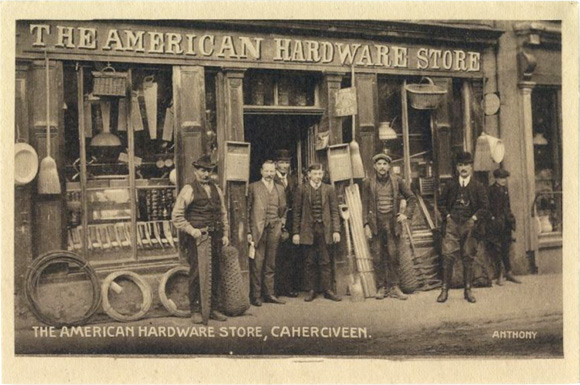
Postcard, image taken from an eBay auction ended 23 January 2011, whose description includes only:
Anthony Photographer and Publisher, Killarney, Co. Kerry
What is most striking in this photo (apart from the crudely retouched lettering), and the proud men standing for the portrait, is the tools: picks, saws, adzes (?) in the window. One is left with questions: What was meant by
American
here, andhardware
? Was there a brother in the U.S., or had someone returned with experience in that business? Was the term meant to distinguish this from local, and less forward-looking, competitors?I know of this image only by its inclusion as frontispiece in William Tillyer’s Hardware Variations on a Theme of Encounter (2002), described here. A search turns up only this eBay description, and advertisements for reprints of another (retouched) version of the same card.

- Barbara Wilde,
I love my quincaillerie
.An (undated) and instructive paean to the author’s neighborhood droguerie/quincaillerie in the blog L’Atelier Vert / Paris Postcard, that no long exists (but see waybackmachine). The difference:
Paris has two types of hardware stores: the quincaillerie, specialized in actual hardware, and the droguerie, not a drugstore but a shop specialized in paints, cleaning products, glues, and other household potions. My neighborhood store combines both these product lines.
since incorporated in Barrie Kerper, Paris: The Collected Traveler — An Inspired Companion Guide (2011) : link (accessed 30 June 2023)

- Empire Hardware (Empire, Leelanau County, Michigan)
Written by Anne-Marie Oomen, originally published in the September-October 2000 issue of Northern Home, and subsequently posted at the Glen Arbor Sun (October 4, 2000): link.
The essay concludes thus —
“I stand before the empty store at the end of Main Street in Empire. Our house is nearly finished. The hardware store stayed open and vitally important through three different ownerships before finally being lost to us. I am sad. Where am I going to rediscover that the world, though not perfect, is not mad, either? Where but in a hardware store will I be able to trust that my universe is a place to be sorted and ordered, a place to be given the forecast of hope and the stuff to make it happen?”Author’s website : link (accessed 30 June 2023).